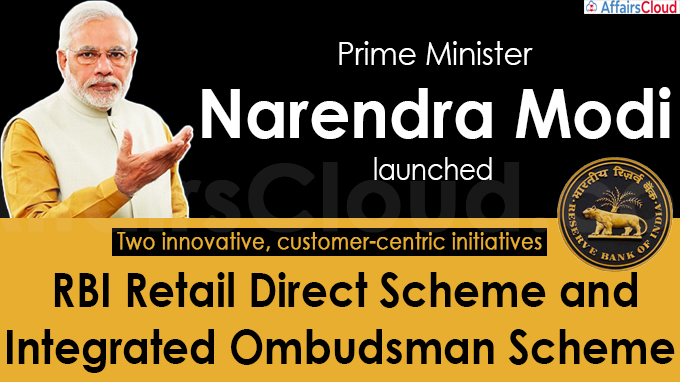
On November 12, 2021, Prime Minister Narendra Modi virtually launched 2 customer-centric initiatives of the Reserve Bank of India (RBI) such as the RBI Retail Direct (RBI-RD) scheme & Reserve Bank – Integrated Ombudsman Scheme (RB-IOS).
- The two schemes would expand the scope of investment in the country and make access to capital markets easier, more secure for investors.
- Finance Minister Nirmala Sitharaman and RBI Governor Shaktikanta Das also participated in the launch.
- The new schemes will unlock India’s $1.1 trillion bond market to retail buyers in the government bond sector.
RBI Retail Direct (RBI-RD) Scheme:
i.The scheme will act as a medium for small investors such as the middle class, employees, small businessmen and senior citizens to have their small savings directly and securely in government securities issued by both Centre and state governments.
- As Government securities have the provision of guaranteed settlement, it will give assurance of safety to the small investor.
ii.Through which, investors could easily open and maintain their government securities account online with the RBI, at free of cost.
iii.Under the Scheme, retail individual investors will be able to open a Retail Direct Gilt (RDG) Account with the Reserve Bank of India, using an online portal (https://rbiretaildirect.org.in).Payments for transactions can be done conveniently using saving bank account through internet-banking or Unified Payments Interface (UPI).Investments can be made using the following routes:
- Primary issuance of government securities: Investors can place bid as per the non-competitive scheme for participation in primary auction of government securities and procedural guidelines for SGB issuance.
- Secondary market: Investors can buy and sell government securities on NDS-OM (‘Odd Lot’ and ‘Request for Quotes’ segments).
Reserve Bank – Integrated Ombudsman Scheme (RB-IOS):
i.RB-IOS was aimed at further improving the grievance redress mechanism for resolving customer complaints against entities regulated by the RBI. The PM stated the scheme is based on ‘One Nation-One Ombudsman’.
ii.Through RB-IOS, RBI will provide a single reference point for the customers to submit documents, track the status of complaints filed and provide feedback.
iii.The Scheme, framed by the Reserve Bank in exercise of the powers conferred on it under Section 35A of the Banking Regulation Act, 1949 (10 of 1949), Section 45L of the Reserve Bank of India Act, 1934 (2 of 1934), and Section 18 of the Payment and Settlement Systems Act, 2007 (51 of 2007), will provide cost-free redress of customer complaints involving deficiency in services rendered by entities regulated by RBI, if not resolved to the satisfaction of the customers or not replied within a period of 30 days by the regulated entity.
Integration of 3 Ombudsman scheme:
i.The RBI after review decided to integrate the current 3 ombudsman schemes such as – the Banking Ombudsman Scheme (BOS), 2006, the Ombudsman Scheme for Non-Banking Financial Companies (OS-NBFC), 2018 and the Ombudsman Scheme for Digital Transactions (OSDT), 2019 into one RB-IOS.
ii.The schemes are administered through 22 offices of RBI Ombudsman (ORBIOs) and 30 regional offices of Customer Education and Protection Cells (CEPCs), which will attend to the complaints that are not covered under the ombudsman scheme.
iii.The scheme was also simplified by covering all complaints involving deficiency in service by centralising the receipt and initial processing of complaints to enhance process efficiency.
iv.In addition to integrating the three existing schemes, the Scheme also includes under its ambit Non-Scheduled Primary Co-operative Banks with a deposit size of ₹50 crore and above.
Some of the salient features of the Scheme are:
- It will no longer be necessary for a complainant to identify under which scheme he/she should file complaint with the Ombudsman.
- The Scheme defines ‘deficiency in service’ as the ground for filing a complaint, with a specified list of exclusions. Therefore, the complaints would no longer be rejected simply on account of “not covered under the grounds listed in the scheme”.
- The Scheme has done away with the jurisdiction of each ombudsman office.
- A Centralised Receipt and Processing Centre has been set up at RBI, Chandigarh for receipt and initial processing of physical and email complaints in any language.
- The responsibility of representing the Regulated Entity and furnishing information in respect of complaints filed by customers against the Regulated Entity would be that of the Principal Nodal Officer in the rank of a General Manager in a Public Sector Bank or equivalent.
- The Regulated Entity will not have the right to appeal in cases where an Award is issued by the ombudsman against it for not furnishing satisfactory and timely information/documents.
Note – As per RBI data, the number of complaints against various regulated entities increased from 1.64 lakh in 2017-18 to 3.30 lakh complaints in 2019-20 due to increased awareness, digital penetration and financial inclusion.
What is the Banking Ombudsman Scheme?
i.It is a forum for bank customers for the resolution of complaints relating to certain services rendered by banks. The scheme is introduced under Section 35 A of the Banking Regulation Act, 1949 by RBI with effect from 1995.
ii.The Banking Ombudsman is a senior official appointed by the Reserve Bank of India to redress customer complaints against deficiency in certain banking services covered under the grounds of complaint.
Recent Related News:
In October 2021, RBI decided to introduce the Internal Ombudsman Scheme (IOS) for certain categories of NBFCs (Non-Banking Finance Companies) that have a higher customer interface to strengthen the internal grievance redress mechanism of NBFCs.
About Reserve Bank of India (RBI):
Establishment– April 1, 1935
Headquarters– Mumbai, Maharashtra
Governor– Shaktikanta Das
Deputy Governors– Mahesh Kumar Jain, Michael Debabrata Patra, M. Rajeshwar Rao, T. Rabi Sankar